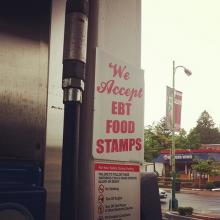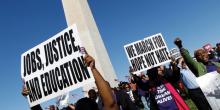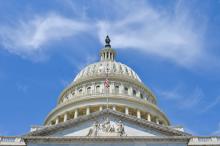SNAP


I don’t typically watch much television. But when I can, I watch The Daily Show. Jon Stewart brings humor, satire and truth telling to the news of the day — qualities also characteristic of the Hebrew prophets. When I once suggested that to Stewart, he immediately denied any similarity, saying, “No, no, no, I’m just a comedian from the Borsch Belt!” But further discussion revealed a selection of topics that evoke his moral passion and even a righteous anger at political hypocrisy.
That was on vivid display in a spotlight on what Fox News commentators were saying about food stamp recipients. It began with Fox saying how families who receive support from SNAP (the Supplemental Nutrition Assistance Program) should use their food stamps, and even what they should and should not be eating, which led to repeated condemnations of poor people.
The clips from those Daily Show commentaries are below and I suggest you take a few moments to watch them. They reveal what I am calling Fox News’ “preferential option for the rich,” which is in stark contrast to the gospel’s “preferential option for the poor” and what Pope Francis is now calling the church back to. Fox News’ repeated preference for the rich and condemnations of the poor is not just a political or economic issue, but a moral and religious failure. The faith community, in particular, should take note.


SNAP began in 1964 when President Lyndon B. Johnson signed the Food Stamp Act as part of his unconditional “War on Poverty.” In his remarks upon signing, Johnson said: “I believe the Food Stamp Act weds the best of the humanitarian instincts of the American people with the best of the free enterprise system. Instead of establishing a duplicate public system to distribute food surplus to the needy, this act permits us to use our highly efficient commercial food distribution system.”
Johnson continued: “It is one of many sensible and needed steps we have taken to apply the power of America's new abundance to the task of building a better life for every American.”
Imagine. Fifty years ago the Food Stamp Act was viewed not as charity, but rather as an ingenious utilization of American enterprise in order to help “build a better life for every American.”
And it is genius.

Many of us may not know what it is like to be hungry, to regularly miss meals, or to consume a diet void of essential nutrients to live a healthy life. Poet, diplomat, and politician Pablo Neruda captures this feeling well in his poem “The Great Tablecloth.” Just before the holidays, millions of Americans learned what some aspect of hunger felt like as they saw a reduction in their SNAP (formerly food stamp) benefits.
On Nov. 1, every SNAP household saw its grocery budget reduced when an $11 billion cut went into effect — the equivalent of 10 million food stamp meals a day. And the program isn’t out of the woods yet. The House and Senate have begun to finalize a farm bill that will impact vital anti-hunger programs. A compromise proposal expected in the coming weeks could further cut SNAP by as much as $8 billion, at a time when lawmakers need to protect and strengthen it.

The central figures in four of the planet’s largest religions – Christianity, Islam, Buddhism, and Judaism – were all once homeless. Moses was encamped in the Sinai, unable to return to the Promised Land. Jesus was born in a manger. Buddha wandered through the wilderness seeking enlightenment. The Prophet Muhammad was forced out of Mecca.
Is it a coincidence that each of these figures was, at key parts of his life, dispossessed from the society around him? Hardly. This is a clear message that even the most powerful can be made powerless.
In both Leviticus and Deuteronomy, believers are directed to give a set portion of their harvest to people in poverty and immigrants. It is neither voluntary, nor are the amounts to be based on charitable whims. It is a commandment to automatically give a specific percent, making it an anti-hunger tax of sorts. In fact, both the Old and New Testaments make it clear that justice is a higher calling than mere charity.
In Mathew 25, not only does Christ proclaim that those who clothe, house, and feed the “least of these” are engaging in acts equivalent to directly aiding the Lord, he also preaches that those who refuse to aid the poor are consigned to damnation.
Most secular ethical traditions also make societal actions to reduce hunger, poverty, and homelessness a centerpiece of their teachings.
Virtually every elected official in Washington claims to abide by these ethical and faith-based traditions. Indeed, many have used their professions of faith to advance their political careers.
Yet many of these same leaders repeatedly take actions opposite to the values they espouse.

The only way to win the “war on poverty” is for liberals and conservatives to make peace — for the sake of the poor. That would be the best way to mark the 50th anniversary of the war on poverty, declared by President Lyndon Johnson in his January 1964 State of the Union address. Making peace means replacing ideologies with solutions that actually solve the problems of poverty. With both Republicans and Democrats speaking out on poverty this week, and the recession slowly receding this should be an opportunity to find the focus, commitment, and strategies that could effectively reduce and ultimately eliminate the shameful facts of poverty in the world’s richest nation.
For any proposal, the basic question must be whether it helps more people and families rise out of poverty and realize their dreams. This means setting aside political self-interest and thinking beyond our too often inflexible ideologies.

In his first Advent address, Pope Francis directed Christians to be guided by the “Magnificat,” Mary’s song of praise for the coming Christ child. She proclaims that God has “lifted up the lowly and filled the hungry with good things” (Luke 1:52-53). This past Tuesday, Pope Francis heeded his own exhortation by releasing a video message calling for an end to hunger as part of a worldwide “wave of prayer.”
Hundreds of Christian organizations across the globe participated in the “wave of prayer,” which was organized by Caritas International, a confederation of Catholic charities in the Vatican.
“We are in front of a global scandal of around 1 billion people who still suffer from hunger today,” Pope Francis said in his message. “We cannot look the other way.” The wave began at noon on the Pacific island of Samoa and proceeded west with people of faith from each subsequent time zone participating at noon their time.

Fear, anxiety, and secrecy marked the roughly year and a half I received federal food stamps.
Like the New Testament’s famed Samaritan woman who snuck to the well at an odd hour to get water, I tried to retrieve the sustenance my family needed outside the view of my immediate community.
I tried never to let those around me see me using the food stamp card, and certainly wouldn’t have ever told my extended family or friends. I wanted no one to know I was living outside the bounds of “acceptable” life.
I had decided to find out whether I qualified for the Supplemental Nutrition Assistance Program (SNAP) while a full-time seminary student trying to raise three teens — one of them in college. I worked jobs as much as I could around my school schedule, but in the end I never had enough money to pay bills, meet my children’s needs, and buy enough groceries for the month.

Last week, Half in Ten released its third annual report on its commitment to and efforts toward U.S. poverty reduction. The Half in Ten Campaign is a joint project of the Center for American Progress Action Fund, the Coalition on Human Needs, and The Leadership Conference on Civil and Human rights, with a mission to build political and public will to cut the nation’s poverty rate in half in 10 years.
In her remarks, Neera Tanden, president of the Center for American Progress, stressed the need to move the conversation in Washington away from implementing austerity measures that ultimately harm the poor.
Scripture also reminds us over and over again to care for the least of those in society, including widows, orphans, and immigrants in our midst. We are called to be generous with what we have. Labor Secretary Thomas Perez echoed this truth at the Half in Ten meeting, urging that at this time, we need to “turn toward one another, not against one another.”

Gov. John R. Kasich (R-Ohio) did a shocking thing recently. He broke with his political allies and decided to expand Medicaid to 275,000 poor people in his state through the Affordable Care Act. Then he called a spade a spade, saying: “I’m concerned about the fact there seems to be a war on the poor.”
Kasich’s statement came just two days ago. And today, 47 million low-income Americans will see their food stamps benefits decrease as stimulus funding ends. In light of this newly named “war on the poor,” I’ve been reflecting on Jesus’ story of the Good Samaritan, and the man’s question to Jesus, “Who is my neighbor?” What an intriguing question.
Of course one of the most incredible things about this story is that Jesus never answers the lawyer’s question. Rather, he tells a story about a man beaten by robbers on a dangerous road. He was stripped naked left lying there, clinging to life. Both a priest and Levite pass him by, but a Samaritan went out of his way, broke his usual routine, used up his own gas (or at least his donkey’s energy) to bring the man to an inn. And he took care of him overnight at the inn, offering the innkeeper what would today be about $330.
And then Jesus flips the script! The lawyer asked who exactly is my neighbor? Who do I have to love? And conversely who can I cross off my need-to-love list?
Jesus doesn’t answer the question. Jesus returns his question with a question: “Who was a neighbor to the man who fell into the hands of robbers?”
Nowadays we hardly have a concept of what it means to be a neighbor anymore.

“Whoever has two coats must share with anyone who has none; and whoever has food must do likewise.” (Luke 3:11)
Many of us are blessed enough to not know what it is like to be hungry, to regularly miss meals, or to consume a diet void of essential nutrients for a healthy life. But now, millions of our brothers and sisters here in the United States may, sadly, be facing these situations because of a reduction in their food stamp benefits.
Starting Friday, all households receiving food stamp benefits will see their food budgets shrink as a temporary increase expires. A family of four could lose up to $36 a month in food stamps (also known as the Supplemental Nutrition Assistance Program, or SNAP).

I couldn’t believe what I heard. On my television screen a member of Congress quoted the Bible in defense of cutting SNAP benefits. He stated in his testimony, “Scripture says if you don’t work you don’t eat.” The only Scripture that came to my mind as I looked on in sadness was “Jesus wept.”
You see, I had just come from the food pantry my church has operated for more than 20 years. With the economic downturn, our pantry volume has steadily increased from 15 to an average of 40-50 families each day we are open. These families are able to shop with us one time in 30 days, and we attempt to provide three meals a day, for three days, for each member of the household. Our clients are beautiful people who are struggling. Each and every day we hear statements such as, “I never thought I would have to come to a food pantry to feed my family,” or “We just can’t make it to the end of the month.” Our clients come from all walks of life and have one thing in common: they’re struggling.
So, as I listened to the congressman use Scripture to marginalize the very people I care for every day, I felt I needed to do something. I could no longer be silent as the Bible was being used to hurt vulnerable people. I had to speak, and I remembered the Faithful Filibuster. I sent a tweet to Jim Wallis asking if they needed support or extra voices, and he replied that in fact they did. This was a Friday afternoon at 4 p.m., my daughter and I were on the road from Ohio to Washington, D.C., the next morning at 5:30.
We arrived in D.C. at 1:45 just in time to change and walk to the small pulpit labeled #FaithfulFillibuster for our 2:30 time slot. As I stepped onto the grass and began to read, the long hours of the trip began to fade away as the words of the Gospel began to cross my lips. I remember feeling that I would have driven a thousand miles to be able to proclaim the good news of the message of Christ and to speak the Word out loud in a way that comforted God’s people. I would have kept on reading until I couldn’t do it anymore, true filibuster style, all the while looking at the Capitol building with all her power. Our Christian story is one of liberation, new life, abundance, and mercy. It is a story that brings good news to the poor, and I will tell it until I no longer have breath.

It’s a rough month to be a Washingtonian.
My morning bike ride past the Capitol Building is leaving me less with the sense of inspiration I used to feel at being so close to the heart of democracy, and more with a creeping sense of disgust. Sometimes it’s tough to live in a city whose very name is a synonym for Congress. “Washington” recently decided to cut off all funding for national parks, health research, and, oh yeah, programs that serve poor Americans.
Thanks to Congress, poor women might not get help from the Women, Infants and Children program to feed their babies. Head Start preschool programs have been canceled, leaving parents unable to work. People who need the SNAP program to feed their families could be left with nowhere to turn, while sick and elderly people who get regular visits from Meals on Wheels volunteers are worried about where their food will come from over the coming weeks.
There are about 40 members of an extremist ideological minority who are ruining the reputation of the place I live and work, and taking the poor down along with them.

AS FIGHTS ABOUT the budget and other economic issues are again riveting the nation’s capital, the rest of the country yawns. Possible government shutdowns, threats to default on our nation’s debt, and proposals to decimate food assistance for struggling Americans seem to be business as usual in Washington, D.C. These budget battles have become so frequent that it is tempting to dismiss it all as political posturing. But that would be a mistake.
The biggest challenge facing Congress should be a non-issue. The debt ceiling is simply the amount of debt the U.S. is legally allowed to hold. It is about paying off the bills that Congress has already incurred from past appropriations—not about giving permission for new government spending, as many people falsely assume. Congress has raised it nearly 100 times since the end of World War II, but it only recently became a political football. Because the consequences of not raising the debt ceiling and defaulting on our nation’s obligations could be catastrophic, some leaders have tried to leverage it for political gain. After the country came close enough to a default in 2011 to receive a credit downgrade, President Obama has responsibly refused to negotiate over raising it. His assumption is that GOP leaders in Congress wouldn’t throw the economy off the cliff for their own political gain. The American people are left watching this game of chicken and hoping somebody blinks.
While this is clearly a partisan game, the stakes couldn’t be higher. The U.S. has always honored its debts. Should the country default, the market turmoil and long-term effects could be catastrophic for the global economy. Domestically, it could throw the U.S. back into recession.

Some read Romans 13 and lean toward faith being a personal thing (pay your taxes and don’t break the laws, avoid sexual immorality, debauchery, jealousy, and instead clothe yourself with Christ), but the chapter also says God has established government as his “servant to do good.”
This is why, in a country where the public is encouraged to participate in government, I want to encourage people of faith to voice the heart of God when it comes to issues like feeding the least of these.

The message of Christ is not often so clearly presented in American media as it was yesterday, nor is that message as clearly contradicted in the same news cycle.
Yesterday, Pope Francis, while not actually changing any doctrinal stance of the Catholic church, clearly asserted in a rare and frank interview that compassion and mercy must be the light that radiates from the global church for the world to see, rather than the church’s current “obsession” with gays, birth control, and abortion.
At the same time that the pope’s words were cycling through the media, other words were also coming through loud and clear: those of Republican lawmakers who have decided that the least of these will remain just that and, accordingly, voted to slash the food stamp budget by almost $40 billion.
The juxtaposition presented between these two events is striking. It also represents an enormous divide among Christians, and, frankly, demonstrates why so many feel Christianity is a religion full of hypocrisy.

Yesterday, before Republicans in the House of Representatives voted to push through a plan to slash nearly $40 billion from the food stamp program, Jim Wallis said we would keep an eye on which way of our elected officials voted.
"We will be watching who votes against feeding the hungry this week and will remember to bring that to public attention when they run for re-election. We will be doing our own faith count today. Stay tuned for the results."
Well here are the results. The plan passed narrowly, 217-210 — with all the yea votes coming from the Republican side. Fifteen Republicans joined with the Democrats against the plan.
So, who voted for that $40 billion cut to the food stamps program, which would kick an estimated 4 million hungry people out of the program next year? Here's your list. Is your Congress member on it?

The House of Representatives on Thursday evening narrowly passed a plan that cuts about $40 billion* from the Supplemental Nutrition Assistance Program (SNAP), or food stamps program. The Congressional Budget Office estimates that the move will push nearly 4 million low-income people off of the program in 2014. USA Today reports:
"The House voted 217-210 for the bill that cuts nearly twice as much from food stamps as a bill the House rejected in June. It is also far more than a Senate measure passed earlier this year that would trim about $4.5 billion in spending. The bill failed to draw the support of a single Democrat, many of whom have said the steep cuts would erode a key safety net depended upon by families with children, seniors, veterans and people looking for work."
Earlier on Thursday, Sojourners President Jim Wallis condemned the then-proposed cuts, saying, "These same politicians are not willing to go to where the real money is: the Pentagon budget, which everyone knows to be the most wasteful in government spending, or the myriad subsidies to corporations, including agribusiness subsides to members of Congress who will be voting to cut SNAP for the poor. ... They are going after cuts to the poor and hungry people because they think it is politically safe to do so. So let’s call that what it is: moral hypocrisy."
Check back with Sojourners for details on how your congressperson voted.

If you know the facts and faces of the hungry families that are helped by SNAP, I believe it is a moral and even religious problem to vote to cut them. The Bible clearly says that governmental authority includes the protection of the poor in particular, and instructs political rulers to promote their well-being. So the argument that the poor should just be left to churches and private charity is an unbiblical argument. I would be happy to debate that with any of our conservative Congressmen who keep telling our churches that we are the only ones who should care for the poor. To vote against feeding hungry people is un-Christian, un-Jewish, and goes against any moral inclination, religious or
Finally, for politicians to defend these SNAP cuts because of our need to cut spending generally is un-credible and incredible.
These same politicians are not willing to go to where the real money is: the Pentagon budget, which everyone knows to be the most wasteful in government, or the myriad subsidies to corporations, including agribusiness subsides to members of Congress who will be voting to cut SNAP for the poor.
Tea Party-elected Rep. Stephen Fincher, (R-Tenn.), who likes to bolster his anti-poor rhetoric with misused Bible verses, collected $3.5 million in farm subsidies between 1999 and 2012, according to the New York Times. Fincher is helping to lead the effort to cut food stamps to working families with children by illogically quoting: “The one who is unwilling to work should not eat,” all the while collecting millions of dollars in agricultural subsidies. Congressman Fincher's position is hypocritical — and it's this kind of hypocrisy that makes Christians look bad and turns young people away from the church.
You see, for many House conservatives this isn't really about SNAP, but about their opposition to the idea that as a society we have the responsibility to care for each other, even during the hard times or when resources are few. Conservatives know their ideas for privatizing Social Security or cutting funding to Medicare and Medicaid are politically unpopular, but their ideology of individualism that borders on social Darwinism remains unchanged. SNAP is the perfect target for them. The image of what it does and whom it serves has been widely distorted by the media, while the people who benefit from it have little influence in the halls of Congress and pose little risk to the political careers of Republican members.